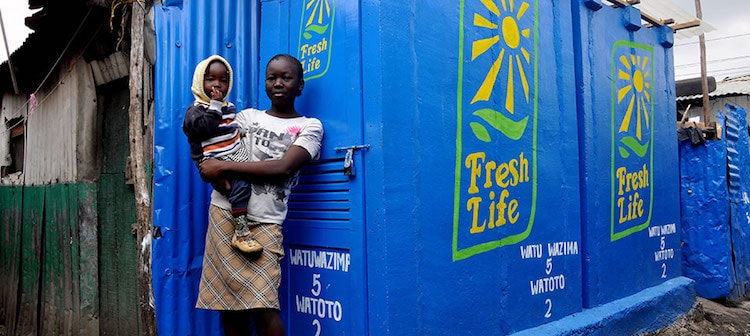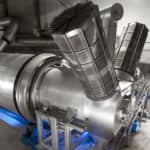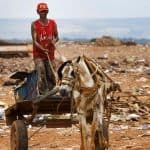Powering Communities Through a Surprising Source of Renewable Energy: Human Waste
Around the world, a staggering 2.5 billion people still lack access to decent toilets. That leads to far too many people getting sick from preventable diseases: Every day 2,200 children die of diarrhea.
The impact of poor sanitation extends to whole economies. Developing countries lose about 1.5 percent of their GDP to productivity losses because of waterborne diseases.
This is a problem that is crying out for new ideas. And there’s good news on that front. A group of smart, creative companies is experimenting with ways to make sanitation services profitable in the developing world. By turning human waste into useful products like fertilizers and renewable energy, they are wringing profits from a surprising resource. Here are three companies that are making the most of this opportunity.
Sanivation
Sanivation provides clean, affordable sanitation services to poor, urban communities in Kenya. Through partnerships with households, local governments and refugee camps, the company installs modern container-based toilets for free and charges a small fee to service them. Then, instead of dumping the human waste, they collect, treat and process it into a clean-burning alternative to charcoal briquettes.
These briquettes are less expensive than traditional charcoal, produce less smoke – and actually have no smell. That is good news for Sanivation’s customers, who are exposed to fewer toxic fumes and indoor air pollution. The alternative fuel also reduces the number of trees that are cut down to produce charcoal.
The toilet service also prevents the contamination of local water sources. Now, the company is working with a water service provider in Naivasha, Kenya, to pilot its waste treatment model for communities that aren’t connected to sewer services. And, it is implementing a scaled-up treatment system that can treat of human waste per month. By 2020, the company hopes to add new branches refugee camps throughout East Africa to serve over 1 million people.
Pivot Works
Pivot Works is a city-scale treatment solution that collects human waste and processes it into “Pivot Fuel” in Rwanda. It then sells this fuel to industrial customers like cement companies to power their kilns or factories. Compared with other biomass fuels, Pivot Fuel has 20 percent more energy and 10 percent less moisture, and it meets the strictest international hygiene standards. “Fecal sludge” is a term that may lead some to lose their appetite, but Pivot Works has made great use of this plentiful input.
By turning waste into a cost-competitive, renewable fuel, the company defrays the costs of providing sanitation services to the urban poor. At the same time, it rebrands human waste as a raw material, and sanitation as an opportunity rather than a burden for local governments.
Pivot Works is working toward the day when the profits from fuel sales will completely cover the cost of treating human waste in its factories. This would be a turning point for the company and cities working to close the sanitation gap.
Sanergy
Getting access to safe toilets is particularly difficult for families who live in slums, where weak infrastructure and overcrowding can be a deadly mix. Sanergy is working to address this challenge by building a sanitation value chain that makes sense for urban slums in Kenya.
Sanergy builds and franchises low-cost sanitation centers that provide clean toilets to slum residents, then safely collects the waste and converts it into useful end-products such as organic fertilizer, insect-based animal feed and renewable energy. Designed by MIT engineers and architects, their modular, “Fresh Life” toilets cost less than $500 and can be up and running in one day.

These toilets are franchised to local entrepreneurs, creating jobs. Sanergy provides training, marketing and other support to help them succeed. The franchise owners advertise the service and build local demand, keep the toilets clean and collect payments on a pay-per-use or membership basis. They ensure a positive experience, providing customers with toilet paper as well as soap and water for handwashing. They also maintain the units, which come equipped with a trash bin, mirror and coat hook.
Every day, Sanergy seals and collects filled waste cartridges from each franchise and replaces them with empty ones. That’s when the waste-to-profit transformation begins. The waste is brought to a centralized facility, where it is composted with sawdust and microorganisms, and turned into organic fertilizer for sale to local farmers. It is also used to support colonies of fly larvae, which are then processed and sold as animal feed. And, the company captures the biogas released by the waste.
Now, more than 50,000 people use Fresh Life toilets every day. The company has collected 2,500 metric tons of waste and created more than 900 jobs that come with contracts, pensions and medical and life insurance.
Harnessing the Economic Value of Human Waste
These companies – and others like them – are changing the economics of sanitation. They are transforming waste into a renewable energy resource, generating power and profits. And, they are making it possible for families to use clean, private toilets, keeping them healthy and safe. In this way, they are moving waste disposal from a burden that governments struggle to afford toward a valuable industry that produces energy, makes money, creates jobs and contributes to healthier communities. It’s a win-win.
Learn more about these companies at www.saner.gy, www.pivotworks.co and www.sanivation.com.
Anne Healy leads Development Innovation Ventures (DIV), where Erin Crossett is a portfolio manager. DIV is part of the U.S. Agency for International Development’s Global Development Lab. It partners with the Gates Foundation to support innovative sanitation models, including the three showcased in this article, which are in the DIV portfolio.
Photos courtesy of Sanivation and Sanergy
- Categories
- Energy, Environment, Health Care, WASH



